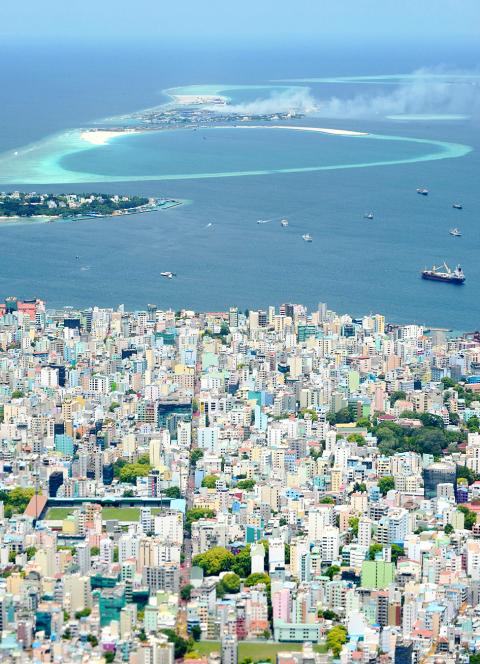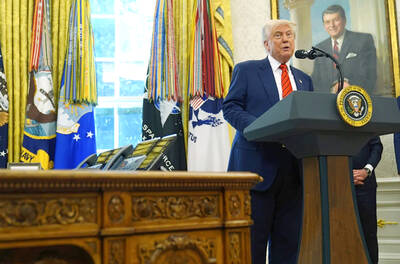As a political crisis plays out in the Maldives, a quiet tug-of-war is taking place around it, with heavyweights China and India vying for strategic dominance in the picturesque Indian Ocean nation.
At first glance, Beijing and New Delhi want no part in the turmoil that erupted on Feb. 1 when the Maldivian Supreme Court overturned the convictions of several opposition politicians, including the president’s main rival.
Chinese and Indian officials spoke in usual diplomatic tones, saying they have no interest in interfering in the archipelago’s internal affairs.

Photo: AFP
However, in reality, both have strategic regional interests to safeguard and are jostling for the upper hand.
Maldivian President Yameen Abdul Gayoom has sent envoys to “friendly nations” China, Pakistan and Saudi Arabia to explain his government’s position since he rejected the court ruling, imposed a state of emergency last week and arrested two of the Supreme Court judges.
His actions fueled suspicion that he has no intention of easing up on eliminating his rivals and tightening his hold on power ahead of this year’s elections.
His most powerful opponent, exiled former Maldivian president Mohammed Nasheed, appealed to India to send troops to end the crisis.
“On behalf of Maldivian people we humbly request: 1. India to send envoy, backed by its military, to release judges & pol. Detainees ... We request a physical presence,” Nasheed tweeted last week.
Traditionally, the archipelago of 1,200 islands and a population of 390,000 Sunni Muslims has been firmly in New Delhi’s sphere of influence, with India even intervening in 1988 when a group of mercenaries tried to seize power.
Its support helped keep former Maldivian president Maumoon Abdul Gayoom in power for three decades and later aided Nasheed, the country’s first democratically elected leader who became famous when he used his low-lying archipelago nation to highlight the risk of rising sea levels and climate change.
However, Male began tilting toward Beijing after Yameen, the half-brother of Gayoom, came to power in 2013 by defeating Nasheed.
Yameen has rolled back many of Nasheed’s democratic gains, with all of his potential political opponents either jailed or in exile.
His government curbed freedom of speech and assembly, with heavy fines imposed on journalists and social media users found guilty of defamation.
In 2015, in a trial widely criticized by rights groups, Nasheed was sentenced to 13 years in prison. He later received asylum in Britain.
China saw the developments as an opening.
“Until 2011, China didn’t even have an embassy in the Maldives. Coming to 2018, it’s seen as a big player in this whole Indian Ocean region,” said Mahalakshmi Ganapathy, an India-China expert at Singapore’s S. Rajaratnam School of International Studies.
When Yameen visited Beijing in December last year, the two countries signed a free-trade agreement that eliminates most tariffs on Maldivian exports, primarily fish, and opens the island nation to Chinese goods and services, including in finance, healthcare and tourism.
China is already the Maldives’ primary source of tourists, whose spending largely drives the economy, and Beijing is investing hundreds of millions of US dollars in an airport expansion, housing development and other projects.
China sees the Maldives as a crucial part of its “One Belt One Road” project along ancient trade routes through the Indian Ocean and Central Asia. The initiative envisages building ports, railways and roads to expand trade — and China’s influence — in a swathe across Asia, Africa and Europe.
China’s massive lending to poor nations for such projects has raised concerns about their ability to repay. Already, Beijing has taken over ports it developed in Sri Lanka and Pakistan on long-term leases.
Nasheed said China is “buying up the Maldives” under Yameen, accusing the Maldivian president of opening up the floodgates to Chinese investments with little or no oversight and transparency.
China has dismissed those allegations.
Beijing is watching the Maldives very carefully. If the political situation turns in Nasheed’s favor, that might shift the balance of influence back toward New Delhi.
India is clearly uneasy with China’s growing presence in its backyard. What is less clear is how it will respond to the current upheaval in the Maldives.
So far, India has not responded publicly to Nasheed’s demand that it deploy soldiers to end the crisis, and it has held off formally meeting with Yameen’s envoy.
Howver, on Friday, the Indian Ministry of External Affairs issued a carefully worded statement aimed at China.
“We note that China has said that Maldives government has the ability to protect the security of Chinese personnel and institutions in Maldives. We hope that all countries can play a constructive role in Maldives, instead of doing the opposite,” the statement said.
“India is in a very difficult position,” said David Brewster, an expert on Indian Ocean strategic affairs at the National Security College in Canberra. “It would like to see Yameen replaced, but it is not sure how to do that.”
“India’s primary concern is not to restore democracy, but rather to reduce China’s influence in the country,” he added.

A new online voting system aimed at boosting turnout among the Philippines’ millions of overseas workers ahead of Monday’s mid-term elections has been marked by confusion and fears of disenfranchisement. Thousands of overseas Filipino workers have already cast their ballots in the race dominated by a bitter feud between President Ferdinand Marcos Jr and his impeached vice president, Sara Duterte. While official turnout figures are not yet publicly available, data from the Philippine Commission on Elections (COMELEC) showed that at least 134,000 of the 1.22 million registered overseas voters have signed up for the new online system, which opened on April 13. However,

ALLIES: Calling Putin his ‘old friend,’ Xi said Beijing stood alongside Russia ‘in the face of the international counter-current of unilateralism and hegemonic bullying’ Chinese President Xi Jinping (習近平) yesterday was in Moscow for a state visit ahead of the Kremlin’s grand Victory Day celebrations, as Ukraine accused Russia’s army of launching air strikes just hours into a supposed truce. More than 20 foreign leaders were in Russia to attend a vast military parade today marking 80 years since the defeat of Nazi Germany in World War II, taking place three years into Russia’s offensive in Ukraine. Putin ordered troops into Ukraine in February 2022 and has marshaled the memory of Soviet victory against Nazi Germany to justify his campaign and rally society behind the offensive,

CONFLICTING REPORTS: Beijing said it was ‘not familiar with the matter’ when asked if Chinese jets were used in the conflict, after Pakistan’s foreign minister said they were The Pakistan Army yesterday said it shot down 25 Indian drones, a day after the worst violence between the nuclear-armed rivals in two decades. Pakistani Prime Minister Shehbaz Sharif vowed to retaliate after India launched deadly missile strikes on Wednesday morning, escalating days of gunfire along their border. At least 45 deaths were reported from both sides following Wednesday’s violence, including children. Pakistan’s military said in a statement yesterday that it had “so far shot down 25 Israeli-made Harop drones” at multiple location across the country. “Last night, India showed another act of aggression by sending drones to multiple locations,” Pakistan military spokesman Ahmed

US President Donald Trump on Wednesday said that he would make a decision about how the US government would refer to the body of water commonly known as the Persian Gulf when he visits Arab states next week. Trump told reporters at the White House that he expects his hosts in Saudi Arabia, Qatar and the United Arab Emirates will ask him about the US officially calling the waterway the Arabian Gulf or Gulf of Arabia. “They’re going to ask me about that when I get there, and I’ll have to make a decision,” Trump said. “I don’t want to hurt anybody’s